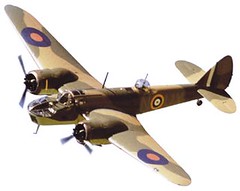
The Ship-Hunters by R.E. Gillman D.F.C, D.F.M
Pbk, 1976
This book is a memoir of an RAF pilot. The author served in WW2 as a Blenheim pilot in the Mediterranean (awarded D.F.C. and D.F.M.). The Bristol Blenheim Mark IV (seen above) was a medium range bomber used extensively throughout the war. The plane held 3 - the pilot, the gunner and the navigator. The pilot controlled the bomb release and the wing mounted guns. The main gunner was in the perspex bubble on the top of the plane and provided covering fire. Located infront of and below the pilot, the nav man lined up the bombing run and got them to the target and home again.
The author writes about his experiences joining the air force and the training in the UK. When he eventually gets his qualifications (in a very accelerated manner) they send him to Gibraltar and then ultimately on to Malta. Malta is located basically in the middle of the Mediterranean and during the war was essentially surrounded by the German army in North Africa and Italy.
This memoir chronicles the various missions that the pilot and his tight-knit crew had to run in and around the tiny island. The fascinating thing about the Blenheim ship hunters was their MO. When the British got intel on a convoy of Axis ships, a group of as many planes would head out in formation. These guys flew up high until they neared their target and then would come down to near sea level often so close that there would be a wake from the planes. They'd come screaming into the convoy which was usually a bunch of military boats surrounding a tanker or supply ship. Literally flying underneath and between the escort boats, the bombers would fly straight at the target boat and pull up at the last second releasing the 250 pound bombs they carried. All this went on under the heavy fire of the escort boats. Needless to say, many planes never made it back to base.
The biggest shortcoming of the book is that Gillman wrote it from memory almost 30 years after he was demobbed and the memoir is unnaturally vague in some areas and vivid in others. He survived many missions that often went against common sense like attacking a heavily fortified port in coastal Italy and comes across with a sense of amazement that war survivors sometimes have.

1 comment:
Despite my interest in WWII, I've never actually read much non-fiction stories from that period (except accounts found in histories). But what an amazing time to be a young man. Those bombing runs sounded insane. That would be scary enough flying that low to the water without actually facing enemy fire and trying to drop bombs on their supply ships!
Post a Comment